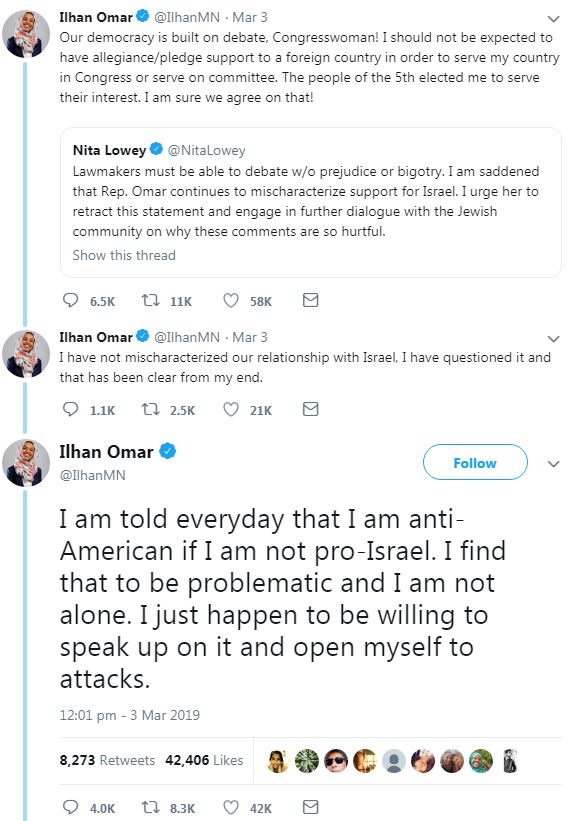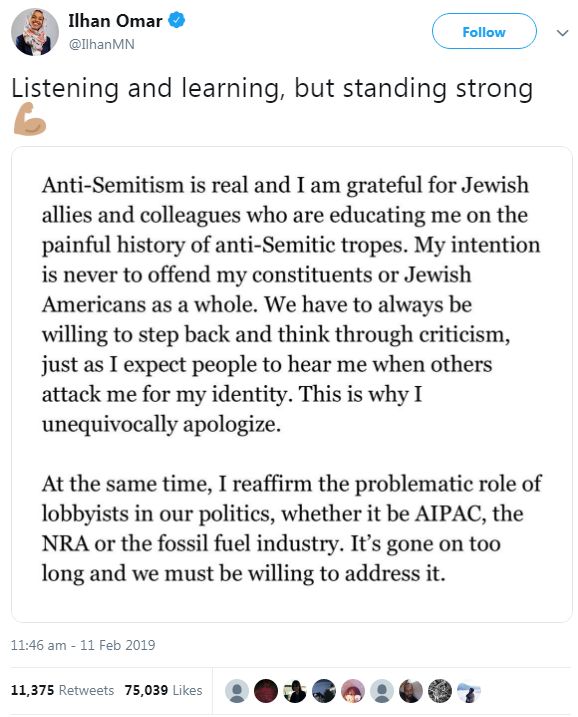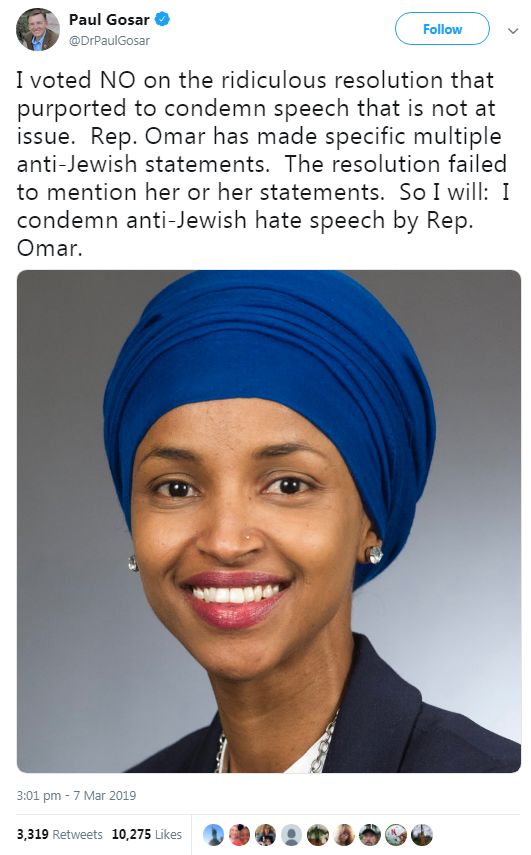Freshman Democrat lawmaker Ilhan Omar triggered an earthquake in Washington that split the political aisle when she touched the forbidden third rail, which is any discussion of the pro-Israeli lobby’s influence on the US political system.
During a bookstore event hosted by Busboys and Poets, Omar told the assembled guests: “I want to talk about the political influence in this country that says it is okay for people to push for allegiance to a foreign country. I want to ask why it is okay for me to talk about the influence of the NRA, fossil fuel industries, or Big Pharma, and not talk about a powerful lobby that is influencing policy.”
Judging how she prefaced the remark, with a lengthy discussion about “the stories of Palestinians” and how she was being regularly accused of ‘anti-Semitism’ to end all debate on the decades-old standoff, it was clear what lobbying group Omar was referring to.
It was the second time in as many weeks that Ilhan Omar, one of the first two Muslims to serve in Congress, was accused of allegedly espousing anti-Semitic comments.
In early February, Omar had responded to a tweet by journalist Glenn Greenwald who said it was “stunning how much time US political leaders spend defending a foreign nation even if it means attacking free speech rights of Americans."
Omar responded, "It's all about the Benjamins baby," followed by a musical emoji.
When pushed by another Twitter user to say who she thinks is paying American politicians to be pro-Israel, Omar responded simply, "AIPAC!"
In fact, Omar was wrong. AIPAC does not raise funds for candidates. But its members do, with the group’s powerful endorsement.
On March 3, Omar tweeted to her fellow Congresswoman, Nita Lowey, that she should “not be expected to have allegiance/pledge support to a foreign country in order to serve my country in Congress or serve on committee…”
Such complaints have been heard before.
In 2014, former Congresswoman Cynthia McKinney told Press TV that her campaign funding suddenly went “kaput” after she refused to sign a “pledge of allegiance” to Israel while she was in office.
“I refused to toe the line on US policy for Israel,” she said.
On another occasion, in 2006, academics John J. Mearsheimer and Stephen M. Walt published a paper in the London Review of Books, entitled “The Israeli Lobby and US Foreign Policy.” In it, the authors discussed the influence of pro-Israel organizations in the United States, with primary emphasis on AIPAC, which they described as “the most powerful and well-known.”
Omar’s string of remarks quickly sparked similar debate, but this time inside of the Democratic Party. This demonstrated the potential future impact of a new generation of multiethnic lawmakers, many of whom, as Muslims, are increasingly frustrated by the Israeli-Palestinian crisis and their inability to discuss it.
Omar, however, was quickly upbraided by senior Democrats.
Speaker Nancy Pelosi (Calif.) called out the freshman lawmaker, saying her “use of anti-Semitic tropes and prejudicial accusations about Israel’s supporters is deeply offensive… and we call upon Congresswoman Omar to immediately apologize for these hurtful comments.”
Although Omar did offer contrition, she refused to budge on “the problematic role of lobbyists in our politics,” mentioning the NRA, fossil fuel industry and AIPAC. It seems like a fair criticism, all things considered.
Following the high-profile fallout, the House Democrats passed, with remarkable alacrity, a House Resolution that condemns anti-Semitism as “hateful expressions of intolerance…and anti-Muslim discrimination and bigotry against minorities.”
The resolution, while intended to tamp down messages of hate, conspicuously failed to mention Omar’s purportedly anti-Semitic remarks, focusing its attention instead on “white supremacists” and “white nationalists,” who were not even remotely mentioned by Omar during her bookstore comments, thus prompting 23 Republican lawmakers to reject the resolution.
The partisan smashup helped to deflect attention away from the main point of contention with regards to Omar’s claim, which on the face of it does not sound radical: Does the American Israeli Political Action Committee (AIPAC), as well as the other powerful lobbying groups, hold too much sway over US foreign policy? Should AIPAC be ranked as an agent of a foreign power working on behalf of Israeli interests in the US?
Mearsheimer and Walt certainly thought so. In their paper, they quoted a 1997 article in Fortune magazine, which asked members of Congress to name the most powerful lobbies in Washington. AIPAC was ranked second behind only the American Association of Retired Persons (AARP), but ahead of the AFL-CIO and the National Rifle Association (NRA). The authors were quick to point out, however, that there was nothing inherently wrong about the way AIPAC operates. “For the most part, the individuals and groups that comprise the Lobby are doing what other special interest groups do, just much better.”
How much better? Well, consider that in 2016, during a breakdown in relations between the Obama White House and Israel over the question of nuclear talks with Iran, AIPAC helped persuade the Republicans to let Israeli Prime Minister Benjamin Netanyahu address a joint session of Congress – without the foreknowledge of then President Barack Obama. As a thought experiment, try and imagine the same privilege being extended to any other leader in the world. The reason it is difficult to imagine is because it’s never been done before precisely because it’s unconstitutional.
“Democrats accuse Boehner of ambushing the president as the Republicans push – with the backing of the pro-Israel lobby in Washington – to strengthen sanctions against Iran,” as the Guardian reported.
Another example came with the push for war against Iraq following the terrorist attacks of 9/11 against the United States. An article in the Forward admitted that as “President Bush attempted to sell the … war in Iraq, America’s most important Jewish organizations rallied as one to his defense.” As Mearsheimer and Walt pointed out, this lobbying influence on behalf of war did not flush with the opinion of the US Jewish population.
“Samuel Freedman reported just after the war started that a compilation of nationwide opinion polls by the Pew Research Center shows that Jews are less supportive of the Iraq war than the population at large, 52% to 62%. Thus it would be wrong to blame the war in Iraq on “Jewish influence,” the academics argued.
Indeed, as Paul Waldman argued in The Washington Post, in the United States today, “a ‘supporter of Israel’ is much more likely to be an evangelical Christian Republican than a Jew.”
Whatever the case may be, the essence of the question remains the same: Does AIPAC, as well as many other lobbying groups, wield too much power in the US political system? The question cannot be casually brushed aside as ‘anti-Semitic,’ any more than questioning the power of Big Pharma, for example, could be dismissed as ‘anti-Doctor,’ or the power of the NRA as ‘anti-Cowboy.’ It makes no sense, and unfairly accuses people who are asking legitimate questions of the most loathsome charges.
With the face of the American political system changing along ethnic and religious lines, it is critical that such issues with regards to political influence get a fair hearing.












